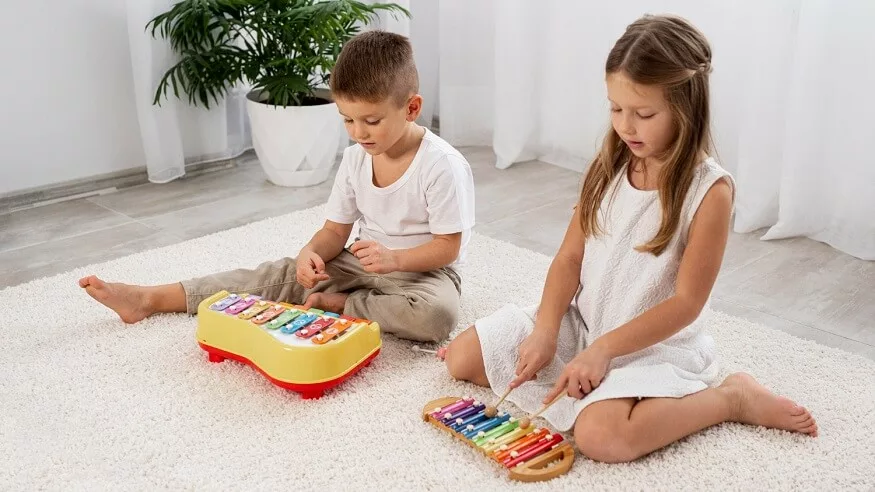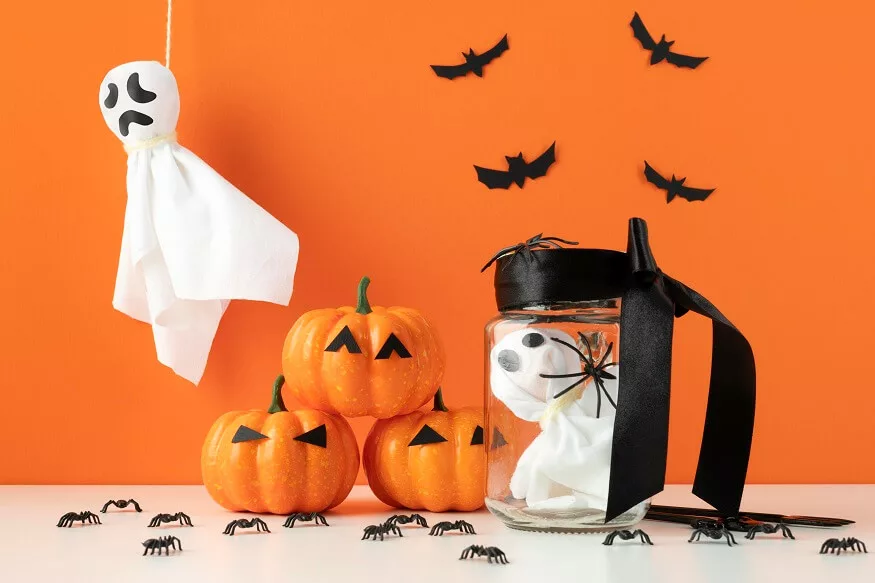Music and games play a crucial role in child development. Music educates and enhances young minds, fostering cognitive growth in children. Games for kids play a vital role in increasing their views mentally and boosting their emotional health. Creativity, emotional intelligence, and social abilities are all developed by games for kids.
These music games are a wonderful way to engage kids in healthy activities at home. We will explore the various types of music games for kids that can help child development and bring joy to them.
Music Games for Child Development:
1) Musical Chairs:
Musical Chairs is a classic game that helps develop various skills in kids while providing a fun and interactive experience. Game songs, in particular, play a major role in kid’s imaginations, promoting learning, and enhancing cognitive abilities.
It promotes gross motor skills as they walk or dance around the chair. As the game progresses and chairs are removed, children must make quick decisions on which chair to target. They learn to adapt to changing situations, assess their options, and make strategic choices in a limited time frame.
Steps to Play Musical Chairs
- Arrange chairs in a circle, one less than the number of players.
- Play lively music while children walk or dance around the chairs.
- When the music stops, kids quickly find a chair to sit on.
- One child left standing is out; remove one chair.
- Repeat steps 2-4 until one player remains.
- The last player sitting wins the game.
2) Freeze Dance:
Freeze Dance is a game where children dance or move to music and freeze in place when the music stops. The objective is to hold a frozen position until the music starts again. The game combines movement and listening skills in an entertaining way
The game allows kids to explore various dance styles, create their own unique moves, and showcase their creativity while dancing to the game songs.
Steps to Play Freeze Dance
- Gather a group of kids and select upbeat music.
- Start playing the music and encourage everyone to dance freely.
- Randomly pause the music and shout “Freeze!”
- When the music stops, participants must freeze in their current dance pose.
- Observe who can hold the pose without moving.
- Resume playing the music and repeat the process several times.
- Have fun and celebrate everyone’s dancing skills and ability to freeze on cue.
Also read : List of Improv Games for Kids
3) Pass The Parcel:
In this game, a small gift or prize is wrapped in multiple layers of paper, with a small surprise or activity hidden between each layer.
Pass the Parcel encourages children to take turns, promotes listening skills, and enhances hand-eye coordination. It also fosters anticipation, builds resilience, and nurtures the spirit of sharing and celebrating together.
Steps To Play Pass The Parcel:
- Gather a group of players in a circle.
- Wrap a small prize in multiple layers of wrapping paper.
- Start playing music and have players pass the parcel around.
- When the music stops, the player holding the parcel unwraps one layer.
- Repeat until the final layer reveals the prize.
- To keep everyone involved, add challenges or trivia between un-wrappings.
- The player who unwraps the last layer wins the prize.
4) Match The Sounds:
“Match the Sound” is a delightful game that helps children develop their listening skills while having fun. It involves recognizing and connecting different sounds to their corresponding objects or sources. By playing this game, kids can enhance their auditory perception, concentration, memory, and cognitive abilities.
Steps To Play Match The Sounds:
- Prepare a collection of sound recordings or use a sound-making device (e.g., smartphone or tablet with pre-recorded sounds).
- Place the objects in a bag or container, ensuring they are hidden from view.
- Have the child close their eyes or turn away.
- Randomly select an object from the bag and make its sound.
- The child listens carefully and tries to match the sound with the corresponding object
- Once they make a guess, reveal the object to check if it’s correct.
- Repeat the process with different sounds and objects to continue the game.
Also read : Loose Parts Play for Kids – What You Need to Know
5) Singing Relay:
Singing Relay is a team-based game where children take turns singing songs or specific portions of songs in a relay format. It helps children improve their musical skills, including pitch, rhythm, and vocal control.
Kids develop their memory and listening skills as they recall and reproduce lyrics and melodies. Children develop their motor skills by synchronising their movements with the music and the relay format. Singing Relay encourages cooperation and teamwork. By performing in front of their peers, children gain confidence in their singing abilities.
Steps To Play Singing Relay
- Divide players into teams.
- Start with a chosen song and designate a starting team member.
- The first player sings a line from the song.
- Once done, the next player continues with the next line.
- The relay continues until all players have sung a line.
- The last player finishes the song.
- The team that completes the song accurately and quickly wins the game.
6) Name That Tune:
Name That Tune is a music-based game where participants listen to short snippets of songs and try to guess the song title and the artist as quickly as possible. This game improves children’s ability to recognize melodies and rhythms. The game challenges kids to recall song titles and artists based on short segments of music. This enhances their memory skills.
Children need to focus on the musical clues and analyse them to identify familiar songs. This activity improves their attention to detail and auditory processing skills. To successfully guess the song, children must think critically and analyse the musical clues provided. It encourages friendly competition, teamwork, and communication as kids work together to solve the musical puzzles.
Steps To Play Name That Tune
- Gather a group of friends or family members and explain the rules of the game.
- Choose a designated “DJ” who will play short snippets of songs from various genres and eras.
- The rest of the players listen carefully and try to guess the name of the song as quickly as possible.
- The DJ can adjust the difficulty level by selecting well-known or more obscure songs.
- Each player gets one chance to guess the song title.
- Award points for correct answers, and keep track of scores throughout the game.
- The player with the highest score at the end of the game wins.
Also read : Rebus Puzzles: What Are Rebus Puzzles? Types, Tips to solve, benefits
Conclusion:
At EuroSchool we understand that music games for kids encourage teamwork, critical thinking, and problem-solving. These events provide parents and teachers the chance to connect, share knowledge, and develop fun learning experiences. Games and music are essential for fostering child development.










